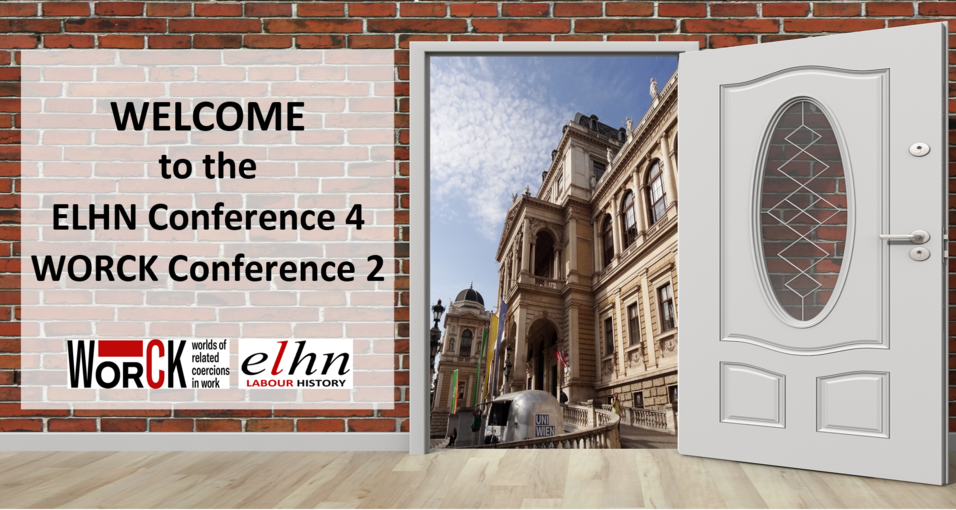Die Konferenz der beiden europäischen Netzwerke zur Geschichte der Arbeit (das „European Labour History Network“ und die COST Action „Worlds of Related Coercions in Work - WORCK“) rückt näher. Am Mo, 30. August 2021 startet am Campus der Universität eine hybride Veranstaltung mit über 300 Teilnehmer*innen.
Für Gäste aus Wien ist auch eine Anmeldung vor Ort am Welcome Desk des Campus möglich.
Bitte beachten Sie, dass Teilnehmende vor Ort die 3G-Regel (geimpft, getestet, genesen) erfüllen müssen!
Organisationsteam: Juliane Schiel, Teresa Petrik, Laura Šukarov-Eischer, Corinna Peres, bis Juli: Lukas Neißl
Informationen und das aktuelle Programm finden Sie hier.
Ausgewählte Programmpunkte:
Mo, 30. August 2021, 16-17.30 Uhr
Ort: Hörsaalzentrum C2
Exhibition Opening
Chairs: Anamarija Batista (Academy of Fine Arts, Vienna), Corinna Peres (University of Vienna)
Discussants: Dariia Kuzmych (Illustrator), Monika Lang (illustrator), Tim Robinson (illustrator), Anna Hofbauer (exhibition designer)
The textual narratives presented at the WORCK Conference 1 "Reconceptualising Wage Labour" will be reworked into illustrations. We will discuss how this transformation process was created and
how the intermedial gesture influences knowledge production in relation to the question of wages and coercion. Afterwards, the exhibition "Stories of Work and Coercion: Scientific Contributions Depicted in Illustrations" will be presented in the basement of building C2.
Mo, 30. August 2021, 18.30-19.30 Uhr
Ort: Hörsaalzentrum C2
ELHN Keynote: Social Rights in Europe and the East-West-Gap
Speaker: László Andor (Secretary General, Foundation for European Progressive Studies; former EU Commissioner for Employment, Social Affairs and Inclusion)
Chair: Susan Zimmermann (Central European University, Vienna)
In 2017 a European Pillar of Social Rights was created, and in 2021 an action plan was also presented by the European Commission to turn the EPSR into reality. However, the developmental gap between East Central Europe and the older EU member states raises questions about the chances of equal social rights to apply everywhere in Europe.
In the East, and especially in countries sliding towards a more autocratic model, divergence from the “European Social Model” has been part of an economic strategy, assuming that social convergence could be a barrier to economic convergence, and especially to capital accumulation by nationalist elite groups. The lecture looks into the specificities of the social models in the Eastern semi-periphery, and investigates various EU policies (minimum wage coordination, Roma integration, rule of law conditionality etc.) aiming to address various aspects of economic or social underdevelopment in the East.
Di, 31. August 2021, 18.30-19.30 Uhr
Ort: Hörsaalzentrum C2
ELHN Roundtable: Working Conditions under Covid-19
Chair: Silke Neunsinger (Uppsala University)
Discussants: Janhavi Dave (Home-Net International), Catalina Benavente (Swedish Labour Movements Archive and Library), Flavia Matei (IG24 – Interest Group of 24-hour care givers), Wolfgang Greif (Austrian Trade Union Federation / Trade Union GPA), Tina Plasil-Laschober (Österreichische Mediathek)
Within the past year, the coronavirus-pandemic has induced massive changes in labour relations: Not only has unemployment reached new peaks in many countries, work itself has profoundly changed its shape in light of limited mobility and safety issues. While the public discourses surrounding work in times of the pandemic often focuses on those segments on the working classes who are able to work remotely from home, the crisis has also made visible existing inequalities in the world of work. Not only have those deemed systemically relevant – be it retail workers, care workers or teachers – found themselves working in increasingly burdensome and riskful conditions. Groups who had already been living and working under precarious conditions to begin with have experienced an immense intensification of their situation.
In this roundtable discussion, we aim to discuss these current processes of disruption, polarisation and precarisation with actors and activists engaging with different areas of the working world, as they are not only highly relevant in regards to the livelihood and living situation of the majority of workers around the world, but also pose new questions and challenges for the engagement with coercion in global labour history. Therefore, we will also engage with the question of how researchers and archivists can document the current crisis to enable analysis not only for current social scientists, but also for future historians.
Mi, 1. September 2021, 16.00-17.30 Uhr
Ort: Hörsaalzentrum C2
Film Screening and Roundtable on Capital Accumulation and Labour Rights in NS Germany, Yugoslavia, and Today’s Serbia
Chairs: Anamarija Batista (Vienna University of Economics and Business), Isidora Grubacki (Central European University, Vienna)
-Screening of the film "Obrani Berači" by Milica Lupšor and Branislav Markuš
- Presentation by Goran Musić (University of Vienna): "Making and Breaking the Yugoslav Working Class"
- Panel discussion with Milica Lupšor (Roza) and Goran Musić (University of Vienna)
After the screening of the documentary film "Obrani berači" by Milica Lupšor, which will give us an insight into the difficult situation of seasonal agricultural workers in Vojvodina and the fight for women's labour rights, we will listen to the presentation by Goran Musić about a story of two Self-Managed Factories in socialist Yugoslavia. Afterwards, we will discuss the issues of organisation of labour relations, social security, and the ideas of co-management processes in the economy.
Do, 2. September 2021, 18.30-20 Uhr
Ort: Hörsaalzentrum C2
Roundtable Discussion: Sezonieri: A Campaign for the Rights of Agricultural Workers in Austria

